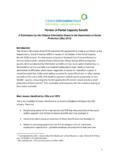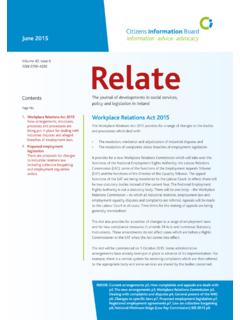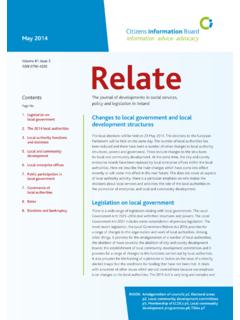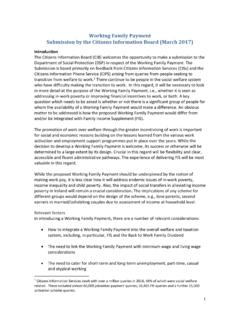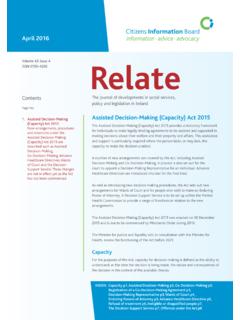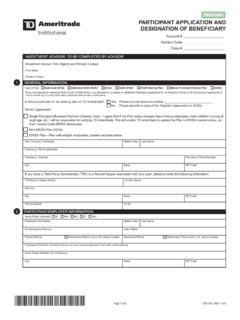Transcription of Social Policy Update - citizensinformationboard.ie
1 Social Policy Update May 2018. Social Policy Update focuses on the Social Policy work of CIB and our delivery services throughout the country. It also provides information on national Social Policy news and developments. Contents CIB Social Policy and Research News 1 3. Submission on Advance Healthcare Directives, Deprivation of Liberty: Safeguarding Proposals, CIS Activity Report 2017, Social Policy Grants. On the Ground: Social Policy feedback from delivery services 4-7. Social Policy Returns from services Q1 2018, Social Policy and advocacy in CISs. In the Oireachtas 8-9. UNCRPD, Jobseekers Allowance for under 26s, Illness Benefit, Medical Card administration.
2 Policy News, Resources and Opinion 10. Central Bank Quarterly Mortgage Arrears Report, ESRI report on minimum wage. CIB Social Policy and Research News CIB submissions and developments Advance Healthcare Directives In May 2018, CIB made a submission to the HSE in respect of its consultation on Advance Healthcare Directives Codes of Practice. An Advance Healthcare Directive is a document which sets out a person's instructions as to the kind of healthcare treatments that they want (or wish to refuse) in the future, when they may no longer have capacity to do so. The requirement for these Directives (and associated Code of Practice) derives from the introduction into Irish law of the Assisted Decision-Making (Capacity) Act 2015.
3 The consultation involved the preparation of a response (by way of a survey) in respect of three separate Codes of Practice - a Draft Code of Practice for Health and Social Care Professionals, another on How to Make an Advance Healthcare Directive and a third for Designated Healthcare Representatives. The submission welcomed the introduction into Irish law of Advance Care Planning and commented on technical aspects of the three Codes of Practice focusing on the use and definition of terms within the legislation, compliance and associated liability, the role of healthcare personnel in initiating advance care planning and the potential challenges for health and Social care professionals in adopting a functional approach to capacity.
4 Notwithstanding the positive implications of advance healthcare directives, the submission notes that the application of advance care planning in practice is complex and that the attitudes, beliefs and practical considerations of health professionals have been shown to influence the uptake of Advance Care need for recognition of the role of independent advocates in the Codes is also noted, as health and Social care practitioners will encounter advocates who will be assisting people with expressing their will and preference in cases where capacity issues arise. The Submission also suggested the need for an easy read' version of the document on How to Make an Advance Healthcare Directive, in order to improve accessibility for all.
5 The HSE has indicated that, following the consultation process, the draft codes of practice will be amended, signed off by the Advance Healthcare Directives Multi-Disciplinary Group and submitted to the Director of the Decision Support Service, for consideration. The National Advocacy Service (for people with disabilities) has also provided a response to this consultation. 1. Update Volume 11, Issue 2 May 2018. Submission on the Deprivation of Liberty: Safeguarding Proposals CIB responded to the Department of Health consultation on deprivation of liberty safeguard proposals in March 2018. A consultation paper had been issued by the Department in conjunction with draft Heads of Bill in order to gain legislative clarity on the issue of deprivation of liberty in residential facilities for older people, those with a disability or mental health issues.
6 This new legislation is required in order to meet specific obligations under the United Nations Convention on the Rights of Persons with Disabilities*, which was ratified by the D il in March 2018. It is intended that these deprivation of liberty safeguard proposals will form a new part of the Assisted Decision Making (Capacity) Act 2015. The submission addressed a range of specific questions put by the consultation in relation to the main provisions of the draft legislation (or Heads'). These draft Heads of Bill' provide the legislative grounding for the various aspects of the Bill and cover such areas as definitions of key terms and words, the application of the safeguarding legislation and the person's capacity to make a decision as to where they live, admission procedures in both routine and urgent situations (specifically regarding legal authority and the role of medical evidence) and the use of restraint practices (in the context of deprivation of liberty, rather than for therapeutic reasons).
7 The draft Heads of Bill also elaborate on areas such as review processes, record keeping and arrangements for existing residents once the legislation commences. The consultation paper acknowledges that the draft provisions represent a very significant cultural However, in order to satisfy the requirements of the Convention and to align with the approach adopted in the Assisted Decision Making (Capacity) Act 2015, a more formal process than that which currently prevails, with the involvement of the court in certain circumstances, is required . Within this context, the CIB submission noted that care is required to ensure that the legal structures and processes that are put in place do not become so cumbersome and bureaucratic that they detract from the quality of care provided to those who require safeguarding and protection.
8 The submission also notes however that deprivation of liberty should occur in accordance with due process of law, and be subject to regular review and lawful challenge. When a citizen is being subject to deprivation of liberty safeguards, it is crucial that appropriate reciprocal measures are in place to protect rights and, in this context, access to independent advocacy will be an important consideration. Concerns have been raised by the disability sector about the compatibility of including deprivation of liberty safeguard provisions within the Assisted Decision Making legislation. The Department has since established an Advisory Group to consider the findings of the public consultation process, in order to advise on any appropriate amendments to the draft Heads of Bill and to ensure that the approach taken integrates effectively with existing legislation.
9 * See also Parliamentary Question on UN Convention on the Rights of Persons with Disabilities later on in this edition. CIS National Activity Report 2017. The 2017 National Activity Report for the CIS network was presented to the Board of CIB in March 2018. The Report outlines the level of caller and query activities for each service and also provides details of the projects that have been rolled out or progressed during the last year. Here we highlight the key Caller/Query profile data from 2017: There were million queries dealt with by services a increase on 2016;. There were 599,016 callers to CISs in 2017 a slight decrease on the previous year Services also dealt with 9,900 once-off' advocacy queries and 2,693 advocacy cases.
10 Social Welfare queries accounted for 45% of all queries logged, with Health (9%), Housing (8%), Employment and Local queries (both at 7%), and Money and Tax representing 6% of all queries. Housing queries continued to increase on a year-on-year basis (an increase of 15% on 2016) with services nationwide responding to a range of 2. Update Volume 11, Issue 2 May 2018. housing issues in relation to local authority and Social housing, renting a home, homelessness and the provision of emergency accommodation. In particular, queries in relation to the HAP payment almost doubled (in line with the national roll-out of the scheme from March 2017). There were almost 60,000 Medical Card queries, which continues to be the largest single query area recorded in 2017.

